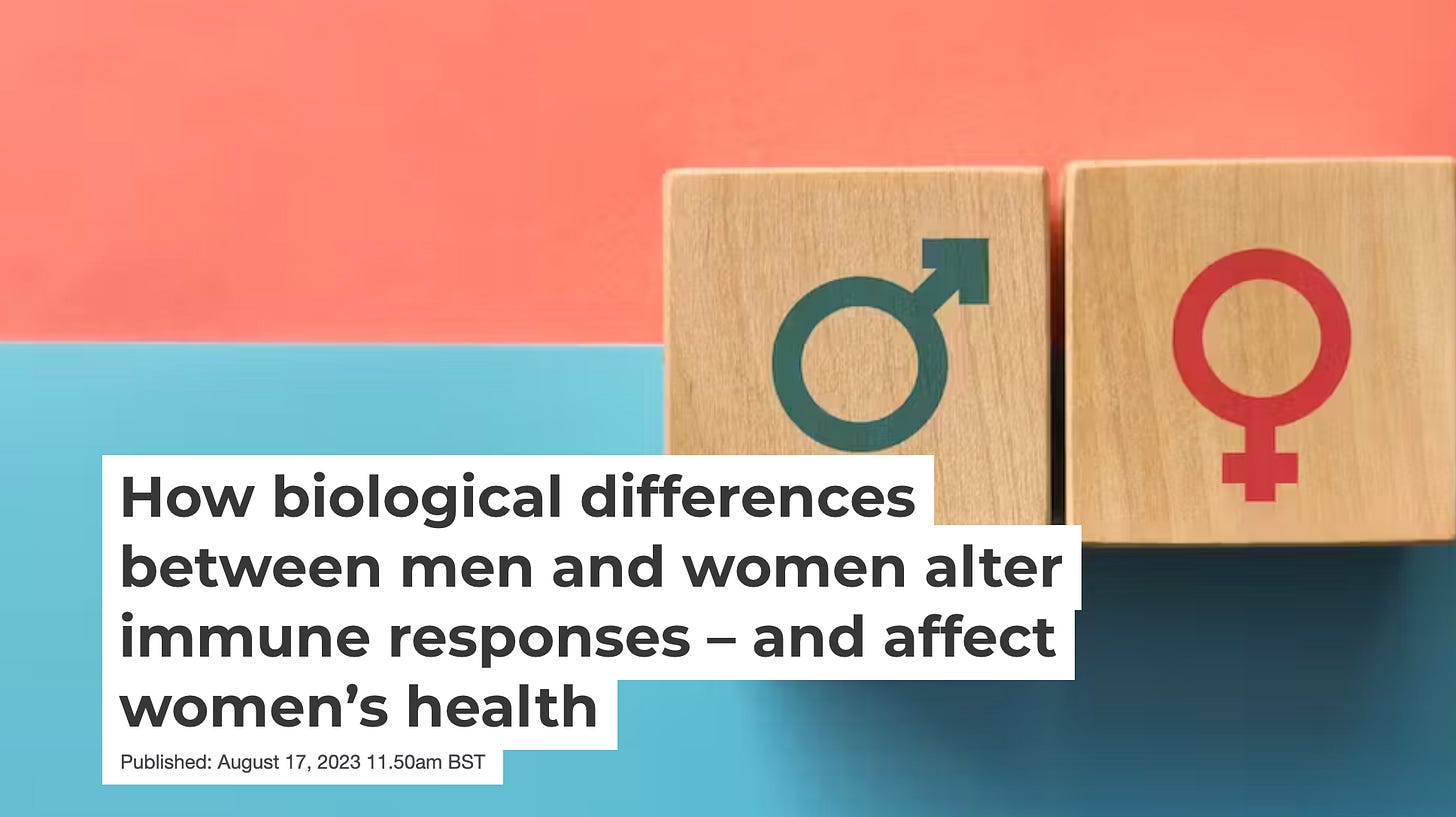Geeky wellbeing favourites: September 2023
Inequalities, women's health, plus the usual mind-body science highlights
You’ve heard of the gender pay gap, but have you heard of the gender health gap? In the UK and other countries, women experience worse health outcomes than men. This can be due to delays in diagnosis, delays in starting treatment or other disease management, or because the treatment itself just doesn’t work that well in women.
Over the past couple of months, my team in my primary job has carried out research to better understand why this is; and feeling stigmatised came up as a key reason. Women who felt discriminated against by their doctor for being a woman understandably felt less supported, and had more challenges getting to a diagnosis and treatment. By contrast, women who felt listened to by their doctor, who felt that their doctor valued their views and experiences, felt empowered to take charge of their health and had better outcomes. Check out the website and the full report.
I’m not sure if this work primed me, but since being involved in it, I’ve come across quite a lot of content around this, and I’m sharing some highlights in this month’s newsletter.
Yoga is a tool for empowerment – and we know that women dominate the yoga class. While our research found that this is not enough to achieve better outcomes, hopefully it helps, even just a little.
5 things to engage with this month
Read
The Conversation has a whole series of articles, all published in August on women’s health (and by that I don’t mean periods and pregnancy, I mean actually the health of women). For example: Did you know that manflu is actually a real thing? Men have a weaker immune system than women, which is why they are more strongly affected by colds. BUT this does mean that women have a stronger immune system and so are more susceptible to autoimmune disease and other conditions that have a strong inflammatory component.
Conditions that affect women more than men receive less research funding, which means we know less about them and there are fewer treatments. This article has great visual of these funding discrepancies.
Listen
This is a really interesting podcast episode on the menstrual cycle, which also talks about the underdiagnosis and undertreatment of heart disease/heart attacks in women.
A podcast summary of the Nature article above, plus a discussion of the other article in the same issue on how menopause affects the brain.
Practice
I hadn’t practiced any yoga nidra in ages and every week I felt jealous of my students lying down all relaxed. So I treated myself to this lovely one and I feel a lot better.
Mind–body science highlights
A few negative findings this month, but always important to report these in addition to any positive ones that come up.
Yoga beneficial for depression in the elderly
This systematic review and meta-analysis looked at the effects of yoga on stress, anxiety, depression and cognitive function in the elderly. They did not find an effect on stress, anxiety and cognitive function, but they did observe an effect on depression. As ever, this reflects mainly the quality of the research out there, so it is still possible that it has beneficial effects beyond depression (only abstract access).
Small effect on PTSD
Another systematic review and meta-analysis looking at the effects of mind–body practices, including yoga and tai chi, in the prevention of post-traumatic stress disorder (PTSD) development. The review found that mind–body practices were slightly effective at preventing PTSD development, but was unable to compare and asses the different practices because of the small number of studies. Note that only 6 studies were eligible to be included in the analysis.
What about yoga studio websites?
Ok this is somewhat random. The authors wanted to find out if yoga studio websites are reflective of what the studio offers – ie, if you were to look online at a studio, would you understand what you’re going to get if you go. The interest here is around the health benefits of yoga, so essentially understanding how helpful the website is to a doctor or other health community practitioner if they wanted to refer a patient for classes.
From the blog
Yoga nidra and women’s health: does it help with our period troubles? – The evidence seems to suggest that yoga nidra might be helpful, likely by reducing stress and bringing back hormonal balance.
Does yoga help with (peri)menopause? – Mixed research on whether yoga can help with this big transition.
Why everyone should practice yoga – Some evidence suggests that yoga can help drive higher health engagement.
Until next month!









